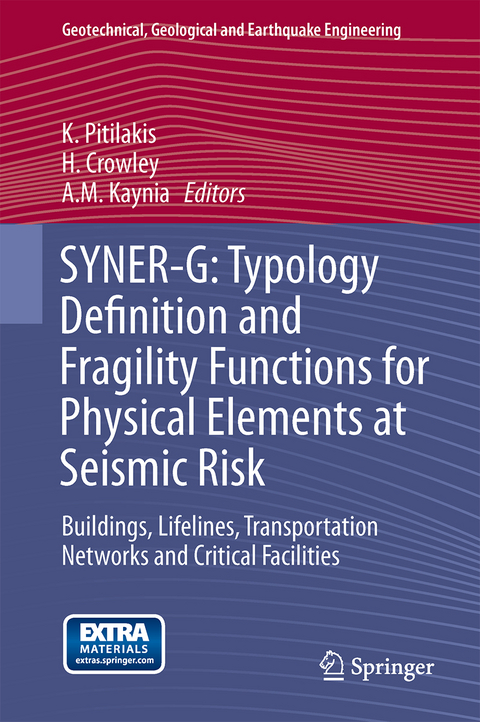
SYNER-G: Typology Definition and Fragility Functions for Physical Elements at Seismic Risk
Buildings, Lifelines, Transportation Networks and Critical Facilities
Seiten
2014
|
2014 ed.
Springer (Verlag)
9789400778719 (ISBN)
Springer (Verlag)
9789400778719 (ISBN)
SYNER-G: Typology Definition and Fragility Functions for Physical Elements at Seismic Risk
Fragility functions constitute an emerging tool for the probabilistic seismic risk assessment of buildings, infrastructures and lifeline systems. The work presented in this book is a partial product of a European Union funded research project SYNER-G (FP7 Theme 6: Environment) where existing knowledge has been reviewed in order to extract the most appropriate fragility functions for the vulnerability analysis and loss estimation of the majority of structures and civil works exposed to earthquake hazard. Results of other relevant European projects and international initiatives are also incorporated in the book. In several cases new fragility and vulnerability functions have been developed in order to better represent the specific characteristics of European elements at risk. Several European and non-European institutes and Universities collaborated efficiently to capitalize upon existing knowledge. State-of-the-art methods are described, existing fragility curves are reviewed and, where necessary, new ones are proposed for buildings, lifelines, transportation infrastructures as well as for utilities and critical facilities. Taxonomy and typology definitions are synthesized and the treatment of related uncertainties is discussed.
A fragility function manager tool and fragility functions in electronic form are provided on extras.springer.com.
Audience
The book aims to be a standard reference on the fragility functions to be used for the seismic vulnerability and probabilistic risk assessment of the most important elements at risk. It is of particular interest to earthquake engineers, scientists and researchers working in the field of earthquake risk assessment, as well as the insurance industry, civil protection and emergency management agencies.
Fragility functions constitute an emerging tool for the probabilistic seismic risk assessment of buildings, infrastructures and lifeline systems. The work presented in this book is a partial product of a European Union funded research project SYNER-G (FP7 Theme 6: Environment) where existing knowledge has been reviewed in order to extract the most appropriate fragility functions for the vulnerability analysis and loss estimation of the majority of structures and civil works exposed to earthquake hazard. Results of other relevant European projects and international initiatives are also incorporated in the book. In several cases new fragility and vulnerability functions have been developed in order to better represent the specific characteristics of European elements at risk. Several European and non-European institutes and Universities collaborated efficiently to capitalize upon existing knowledge. State-of-the-art methods are described, existing fragility curves are reviewed and, where necessary, new ones are proposed for buildings, lifelines, transportation infrastructures as well as for utilities and critical facilities. Taxonomy and typology definitions are synthesized and the treatment of related uncertainties is discussed.
A fragility function manager tool and fragility functions in electronic form are provided on extras.springer.com.
Audience
The book aims to be a standard reference on the fragility functions to be used for the seismic vulnerability and probabilistic risk assessment of the most important elements at risk. It is of particular interest to earthquake engineers, scientists and researchers working in the field of earthquake risk assessment, as well as the insurance industry, civil protection and emergency management agencies.
Preface.- 1 Introduction.- 2 Modeling and Propagation of Uncertainties.- 3 Evaluation of Existing Fragility Curves.- 4 Epistemic Uncertainty in Fragility Functions for European RC Buildings.- 5 Fragility Functions of Masonry Buildings.- 6 Fragility Functions of Electric Power Stations.- 7 Fragility Functions of Gas and Oil Networks.- 8 Fragility Functions of Water and Waste-Water Systems.- 9 Fragility Functions of Road and Railway Bridges.- 10 Fragility Functions of Highway and Railway Infrastructure.- 11 Fragility Functions of Harbor Elements.- 12 Component Fragilities and System Performance of Health Care Facilities.- 13 Fragility Function Manager Tool.- 14 Recommendations for Future Directions in Fragility Function Research.- Index.
| Reihe/Serie | Geotechnical, Geological, and Earthquake Engineering ; 27 |
|---|---|
| Zusatzinfo | 72 Illustrations, color; 99 Illustrations, black and white; XVII, 420 p. 171 illus., 72 illus. in color. With online files/update. |
| Verlagsort | Dordrecht |
| Sprache | englisch |
| Maße | 155 x 235 mm |
| Themenwelt | Naturwissenschaften ► Biologie ► Ökologie / Naturschutz |
| Naturwissenschaften ► Geowissenschaften ► Geologie | |
| Naturwissenschaften ► Geowissenschaften ► Geophysik | |
| Technik ► Bauwesen | |
| Schlagworte | buildings • Fragility Curves • Lifelines • Seismic Vulnerability and Risk • uncertainties |
| ISBN-13 | 9789400778719 / 9789400778719 |
| Zustand | Neuware |
| Informationen gemäß Produktsicherheitsverordnung (GPSR) | |
| Haben Sie eine Frage zum Produkt? |
Mehr entdecken
aus dem Bereich
aus dem Bereich
Gewinnung - Aufbereitung - Speicherung - Verteilung
Buch | Softcover (2022)
Springer Vieweg (Verlag)
CHF 55,95
Methoden – Lösungen – Anwendungen
Buch | Hardcover (2025)
Hanser (Verlag)
CHF 69,95


